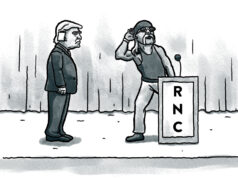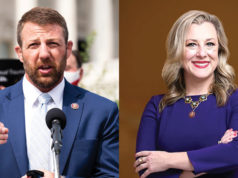CHAPEL HILL, N.C. — In middle school, I went swimming in the ocean for the first time, and I managed to get caught in the undertow. I spun around violently before hitting myself in the face with a boogie board for good measure.
That’s about how I felt living through the 2016 presidential election cycle, and it continues. Before we could even begin processing the election’s outcome, we already had a new story to obsess over: “Breaking News: Some News is Fake News; Nope, Sorry, this Isn’t The Onion.”
In other words, we all remembered that lots of people think everything on the Internet is real, and yes, this includes political stories widely shared on social media.
Profitability spurs fake news
Since Election Day, Buzzfeed analysis showed that fake election stories outperformed real news over the final three months of campaign season. That is to say, news stories created by fake journalists, chatbots and jerks went “viral” more often than news stories created by professionals who give a damn about well-researched, factual information.
One Facebook-focused fake-news writer, Paul Horner, told the Washington Post he could earn around $10,000 a month for publishing fake content. How do you make fabricated content go viral? An eye-catching headline designed to elicit excitement, anger or fear can be boosted as well as anything, and probably better.
Living in a post-truth world
The notion that the public widely considered both Hillary Clinton and Donald Trump to be untrustworthy only exacerbated this problem. Emotions ran so high that facts were routinely relegated to the back seat. Trump’s campaign, however, ran and won on a platform fueled at least partially by rabid hatred of the press and, by extension, the First Amendment. Trump used his rallies to vilify members of the press and spent much of his time telling his audiences that they couldn’t trust what reporters were saying about him. His campaign manager and son even shared fake news without fact-checking it first.
This type of paroxysm is why Oxford Dictionaries on Wednesday declared “post-truth” as its 2016 Word of the Year. Vilification of the press and the blatant — often dangerous — disregard for what can be defined as an “objective fact” has reached a new, disturbing level.
Your parents in 1996: Don’t trust ANYONE on the Internet.
Your parents in 2016: Freedom Eagle dot Facebook says Hillary invented AIDS.
— Daniel Kibblesmith (@kibblesmith) November 19, 2016
Effort to combat fake news meets backlash
So, what is being done to combat the problem?
Lately, individuals and websites have taken steps to identify and publish lists of fake news sites that should be avoided. In a somewhat horrifying twist, the professor who created this excellent Google Doc has temporarily taken down her list “as a safety measure in response to threats and harassment she and her students and colleagues had received.”
Obviously, it is still too early to know exactly how much influence fake news sites wielded throughout the 2016 election, but companies like Facebook and Google are beginning to crack down on how fake news is shared through their websites. Still, they will not be able to fix the problem overnight.
Mainstream media failed as well
While it’s evident that these fake news sites promote dangerous rhetoric that threatens the integrity of the press and our political process, it’s nonsense to declare that all blame should be placed squarely on the purveyors of fake news.
Major media outlets like CNN treated Trump’s presidential bid as entertainment for the better part of the election cycle. (As of March 2016, some studies estimate that Trump had earned at least $2 billion in free media.) In 2015, the oft-insufferable Huffington Post declared Trump was a sideshow and told readers that they could find coverage of his campaign in their “entertainment” section.
Exercise your agency on reality
Much of what is happening right now cannot and should not be taken lightly. That feeling of being hit on the head with sensational news probably isn’t going away soon, so we’ve all got to do a better job of monitoring how we react to what is presented to us.
See something that’s clearly fake online? Report it as spam and move on. Turn off the computer and get involved in your community, and shell out some money for quality news, especially news that’s dedicated to covering local and state politics in your community.
Last — and this I beg of you — please pay attention to what your elected officials are doing right now and pledge to hold them accountable every step of the way.






















